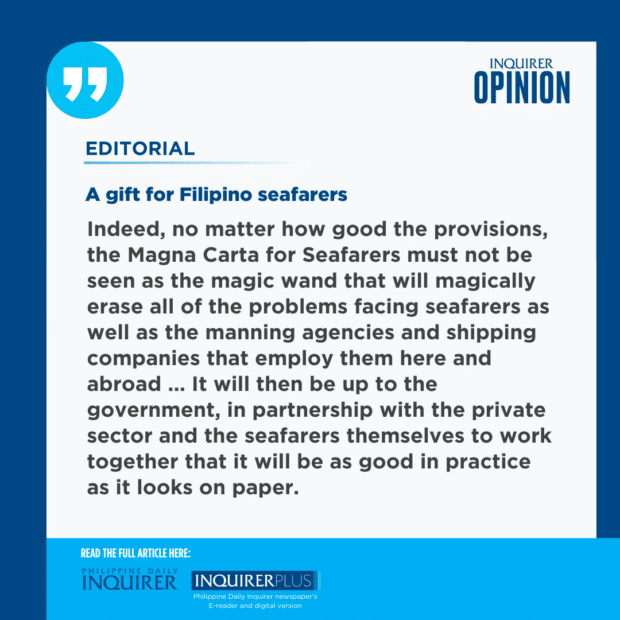
Finally, 20 years after the bill was first filed during the 13th congress in 2004, the Magna Carta of Filipino Seafarers which seeks to promote the welfare of more than half a million domestic and overseas Filipino seafarers was signed into law by President Marcos last Monday.
In his message during the ceremonial signing in Malacañang ahead of the 29th National Seafarer’s Day on Sept. 29, Mr. Marcos said the landmark law was the government’s way of telling Filipino seafarers that, “we see you, we hear you, and we are here to support you.”
At its core, the Magna Carta aims to uphold seafarers’ right to fair and just wages, safe working conditions and skills, education and competency development, in recognition of the unique challenges that they face.
It likewise established mechanisms, rules, and procedures to ensure just execution of decisions granting seafarers’ salaries, wages, benefits, and death and disability claims.
This is particularly timely considering recent attacks on cargo ships and tankers in the Red Sea that put seafarers’ lives at risk, as well as the numerous reports of Filipinos being abused at work.
Pillar of the economy
Recall the case of 39-year-old seafarer Albert M. Coleto, whom the family said died due to sheer exhaustion in October 2023, having worked for 38 hours straight under the scorching heat of the sun on board a bulk carrier anchored in the United Arab Emirates.
Recall, too, a 2023 decision of the Supreme Court upholding the disability claims of a seafarer who had been injured while playing basketball.
The Magna Carta likewise provides for a “more robust” certification process to ensure that Filipino seafarers will meet the Standards of Training, Certification, and Watchkeeping or STCW, as well as the accepted global maritime labor laws.
This will help ensure that Filipinos will keep their place as among the most sought after in the global maritime sector for their work ethic as well as competencies, ensuring also the remittance of over $2.5 billion every month, making them a pillar of the economy.
The focus on elevating standards is a relief as the Philippines had come under increased scrutiny for its training standards and concerns that licenses were being granted without proper processes.
The European Commission (EC) had even warned back in 2021 that it would withdraw its recognition of Filipino seafarers’ certificates unless serious measures and reforms were taken, particularly in key areas like the monitoring, supervision, and evaluation of training and assessment, in compliance with the International Convention on STCW for seafarers.
‘Important victory’
Fortunately, the EC had decided to continue recognizing Filipinos’ credentials and the Magna Carta should further boost their confidence in the quality of the Filipino workforce.
Clear protocols for grievances and disputes will also be enforced to help resolve issues and concerns of seafarers, a provision particularly welcomed by the International Maritime Employers’ Council (IMEC), which believes that the Magna Carta will restore international confidence in the country’s legal system and thus lead to more jobs.
It should be noted that due partly to concerns over “ambulance chasing” or the filing of fake and fraudulent disability or damage claims, the share of Filipino crew on merchant ships that move 90 percent of the world’s goods, from bulk carriers to container ships and tankers, dropped significantly from as high as 45 percent in 1995 to just 14 percent from 2015 to 2021.
The IMEC, however, has expressed confidence that with the Magna Carta for Seafarers in place, “the industry will start on its path to recovery that so many of us have longed for during these difficult years.”
Conrado Oca, president of the Associated Marine Officers’ and Seamen’s Union of the Philippines, hailed the Magna Carta as an “important victory” for all Filipino seafarers serving both domestic and international vessels.
Magic wand
“The Magna Carta of Filipino Seafarers is truly a gift and a wonderful tribute to our noble and hardworking seafarers who contribute greatly to our country’s economy, and are instrumental in moving the world trade, and in keeping the global supply and value chains unhindered,” said Oca.
Not everyone, however, is ecstatic over the passage of the Magna Carta, with the Concerned Seafarers of the Philippines calling the law as fake because of provisions like the requirement for seafarers to post a bond before monetary benefits arising from a disability claim are granted them.
Indeed, no matter how good the provisions, the Magna Carta for Seafarers must not be seen as the magic wand that will magically erase all of the problems facing seafarers as well as the manning agencies and shipping companies that employ them here and abroad.
There are enough positives, however, to keep the vital sector of the economy and society optimistic that it will deliver on its promises. It will then be up to the government, in partnership with the private sector and the seafarers themselves to work together that it will be as good in practice as it looks on paper.